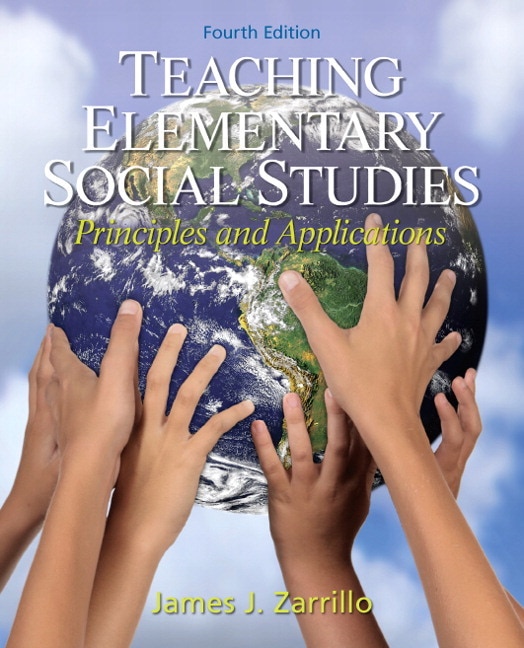
Teaching Elementary Social Studies: Principles and Applications, 4th edition
- James J. Zarrillo

- Find it fast
Quickly navigate your eTextbook with search
- Stay organized
Access all your eTextbooks in one place
- Easily continue access
Keep learning with auto-renew
Part I: An Introduction to the Social Studies
Chapter 1: The Past, Present, and Future of Social Studies Teaching and Learning
Definitions of Social Studies
A Brief History of Social Studies Teaching
21st Century Skills
Social Studies: The Curriculum
Summary of Key Points
Lesson Plans and Instructional Activities
Part II: The Fundamentals of Social Studies Teaching
Chapter 2: Social Studies Lesson and Unit Plans
General Guidelines for Planning Social Studies Lessons
Lesson Plan Formats
Writing Lesson Objectives
Perspectives on the Teaching Sequence
Principles for Planning Instructional Units
Summary of Key Points
Lesson Plans and Instructional Activities
Chapter 3: Assessment of Social Studies Learning
Purposes and Goals of Assessment
Essentials of Effective Assessment
Gathering Data
Analyzing and Sharing Assessment Data
Assessment and Diversity: Final Thoughts
Summary of Key Points
Part III: Differentiation, Integration, and the Development of Academic Skills
Chapter 4: Differentiated Instruction
Linguistic Diversity
Cultural Diversity
Exceptionality
Summary of Key Points
Lesson Plans and Instructional Activities
Chapter 5: A Multicultural, Integrated Social Studies Curriculum
A Multicultural Social Studies Curriculum
The Integrated Curriculum
Summary of Key Points
Lesson Plans and Instructional Activities
Chapter 6: Cooperative Learning
Introduction to Cooperative Learning
An Overview of the Research and Descriptions of Cooperative Learning Structures
Making Cooperative Learning Work
Other Issues in Grouping
Summary of Key Points
Lesson Plans and Instructional Activities
Chapter 7: Inquiry and Critical Thinking
Inquiry: An Overview
A Teaching Sequence for an Inquiry
Inquiry as Cooperative Learning: Group Investigation
Critical Thinking: An Overview
Developing Critical Thinking Skills
Summary of Key Points
Lesson Plans and Instructional Activities
Chapter 8: Literacy
Social Studies Textbooks
Children's Literature: Information Books and Biography
Children's Literature: Fiction
Writing in the Social Studies Program
Summary of Key Points
Lesson Plans and Instructional Activities
Part IV: Content-Specific Instruction
Chapter 9: Democratic Citizenship
Democratic Citizenship: The First Goal of Social Studies
Competing Perspectives on Citizenship Education
Citizenship Education: Content
Citizenship Education: Values
Citizenship Education: Processes
Summary of Key Points
Lesson Plans and Instructional Activities
Chapter 10: History
History in the Elementary School: Overview and Research
History in the Elementary School: Content
History in the Elementary School: Processes
Teaching History in the Elementary School
Summary of Key Points
Lesson Plans and Instructional Activities
Chapter 11: Geography
Geography in the Elementary School: Overview and Research on Children's Understanding of Geography
Geography in the Elementary School: Content
Geography in the Elementary School: Processes
Teaching Geography: Challenges and Principles of Instruction, Map Reading, Map Making
Teaching Geography: Computer-Based Resources
Summary of Key Points
Lesson Plans and Instructional Activities
Chapter 12: The Other Social Sciences and Topics of Special Interest
Completing the Social Studies Curriculum
Anthropology
Economics
Psychology and Sociology
Global Education, Environmental Education, and Current Events
Summary of Key Points
Lesson Plans and Instructional Activities
Children's Literature to Support Social Studies Instruction
References
Author Index
Subject Index